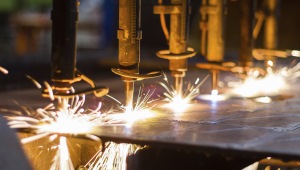Encoders in Factory Automation & Motion Control Applications
Encoders are used in many factory automation systems. By converting mechanical motion into electrical signals, encoders allow factory machinery to track movement, control speed, and maintain accurate positioning.
Precise and Accurate
When precision and timing is key to factory operations running smoothly, Timken® magnetic encoders keep automated machines and conveyor belts moving with high accuracy and repeatability.
Durable and Rugged
While older optical encoders have historically provided accuracy, they often prove problematic in factory and manufacturing applications, due to a lower resistance to dust, contaminates and heat fluctuations. In factory settings, these challenges can compromise the longevity and performance of optical encoders, leading to increased maintenance and potential downtime.
Magnetic encoders are specifically designed to handle harsh industrial conditions. They are rugged, durable and precise even in extreme environments. High temperatures, vibration, shock, and high speeds have no adverse effect. The modular and kit designs offered by our encoders include no moving parts, which further enhances their resilience. High speeds and mechanical stresses that might challenge other encoder types do not impede the performance of magnetic encoders.
Easy Integration
Magnetic encoders also offer a smaller profile than optical encoders, allowing for easier assembly and integration into existing systems. Rotor speed and position accuracy is unaffected by grease or particulates, and magnetic encoders do not require a line of sight gap between encoder sensor and code wheel as optical encoders do.
Versatility in applications
Encoders are used in a wide range of factory automation applications beyond conveyor systems and robotic arms. They are essential in monitoring the performance of motors, adjusting the speed of various mechanical systems, and ensuring that production processes remain on track. From packaging machines to assembly lines and CNC machining, the versatility of encoders means they can be deployed across diverse areas to optimise control and efficiency.
With magnetic encoders, the enhanced ability to withstand extreme environments means that industries such as automotive, aerospace, and heavy machinery manufacturing benefit immensely from their durability and accuracy. In particular, for industries that rely on precise motor control, magnetic encoders provide a higher degree of reliability than other options.
Cost and maintenance considerations
Although optical encoders might have lower initial costs, their susceptibility to damage from environmental factors often leads to higher long term maintenance expenses. Magnetic encoders offer a longer lifespan and reduced need for servicing, which translates into cost savings over time. The absence of moving parts and the resilience to contaminants significantly lower the risk of mechanical failures, reducing downtime and boosting overall productivity.
Future trends in encoder technology
As automation becomes more advanced, the demand for even more precise and reliable encoders will continue to grow. Trends in factory automation point toward the increased use of smart encoders, which integrate diagnostic capabilities, real time data monitoring, and predictive maintenance features. Magnetic encoders, with their robust performance in difficult environments, are well positioned to adapt to these future demands.
Browse our products for factory and manufacturing applications, or contact us with questions.

